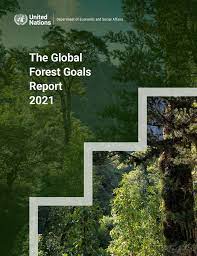United Nations’ Global Forest Goals Report 2021:

According to the United Nations’ Global Forest Goals Report 2021, the Covid-19 pandemic has aggravated the challenges faced by countries in managing their forests.
- The Report has been prepared by the Department of Economic and Social Affairs of the United Nations. It provides an initial overview of the progress of Goals and targets contained within the United Nations Strategic Plan for Forests 2030.
Findings of the Report:
- An estimated 1.6 billion people, or 25% of the global population, rely on forests for their subsistence needs, livelihoods, employment, and income.
- Of the extremely poor in rural areas, 40% live in forest and savannah areas, and approximately 20% of the global population, especially women, children, landless farmers, and other vulnerable segments of society look to forests to meet their food and income needs.
- On the economic front, forest-dependent populations have faced job loss, reduced income, diminished access to markets and information, and for many women and youth, a contraction in seasonal employment.
- Socially, many of these populations are already marginalized and vulnerable groups, such as indigenous peoples, least able to access critical socio-economic safety nets.
- Many forest-dependent populations, especially those in remote or hard to reach places, have faced difficulties accessing healthcare or find that government assistance programs and basic services are disrupted.
- Pandemic-driven health and socio-economic outcomes have increased pressure on forests.
- To ease their growing vulnerability, many indigenous peoples and local communities, as well as returning migrants and urban workers, have retreated deeper into the woods to seek food, fuel, shelter, and protection from the risks of Covid-19.
- Among its many findings, the ‘Global Assessment Report on Biodiversity and Ecosystem Services of the Intergovernmental Science-Policy Platform on Biodiversity and Ecosystem Services (IPBES) highlighted that one million species were at risk of extinction and that 100 million hectares of tropical forest were lost from 1980 to 2000.
- At the same time, climate change is jeopardizing the resilience of forest ecosystems and their ability to support ecosystem services worldwide.
- Though forests offer nature-based solutions to overcome these concurrent global challenges, they have also never been more at risk.




